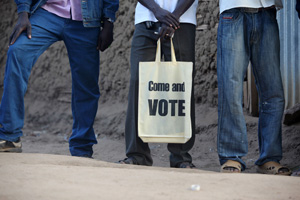
Caritas supported peacebuilding through participation in Sudan. Credits: Sara Farjado/CRS
Fighting in southern Sudan only ended five years ago after more than three decades of war. Many people knew only conflict. “ We have to work at all levels and across all areas to build a sustainable peace,” says Paul Nantulya, an expert in peacebuilding in southern Sudan with one of the American Caritas members, CRS.
“ The churches are the peacebuilding architecture on which everything rests in southern Sudan; they have deep institutional memory, knowledge and skills. We have built ‘people-to-people’ diplomacy and discussion from the grassroots, to the military, to the top political leadership. Crucially, we have invested in giving people training and livelihoods, which makes them less likely to pick up a gun again.”
Duku Martin John was one of many young men who had known nothing but war. Now he’s the host of “One People”, a radio show about reconciliation which is supported by the Sudan Catholic Radio Network. “I couldn’t handle the papers the first time I went on air,” he said, “My hands were shaking so much. I’m very proud of myself as I can do it now, even though I was forced from my home and came from a poor school.”
Other young people have been trained as journalists and sound engineers and use high-tech studios to broadcast messages of peace and civil participation.
Political participation had extra importance throughout 2010, as southern Sudan geared up for a referendum on its future in the opening days of 2011. As tensions rose, the Catholic Church stepped up its encouragement for people to exercise their freedom to vote and to do so peacefully. Sudan’s Catholic bishops also called for help from outside the country to ensure that the historic poll would be free, fair and non-violent.
They travelled as part of an ecumenical delegation to New York in October to advocate directly with the UN Secretary General Ban Ki- moon and launched a “101 Days of Prayer ” campaign for supporters everywhere. The campaign was embraced by Caritas members and gave great support to people in southern Sudan. Fr Santino Maurino Morokimomo, Secretary General of the Sudan Catholic Bishops’ Conference, said, “Knowing that there were many thousands joining us in prayer gave us hope that peace was possible despite the challenges we faced.”
Caritas worked practically on the ground ahead of the vote in case violence did break out. A Caritas Emergency Preparedness Appeal pre-positioned survival supplies near key flashpoints and trained staff to prepare and plan for any contingency. And a week before the vote, a box filled with some of the prayers for peace was entrusted to the waters of the Jur River in the once war-torn town of Wau. Those prayers were answered with a calm and orderly vote in January.
And what of peacebuilding expert Paul Nantulya? “I t is a humbling experience to see the enthusiasm of the people of southern Sudan for peace, reconciliation and reconstruction. I am proud that the Churches have been able to help them. Now is an historic moment, like when South Africa chose freedom in 1994. It gives me optimism and pride in being an African.”
